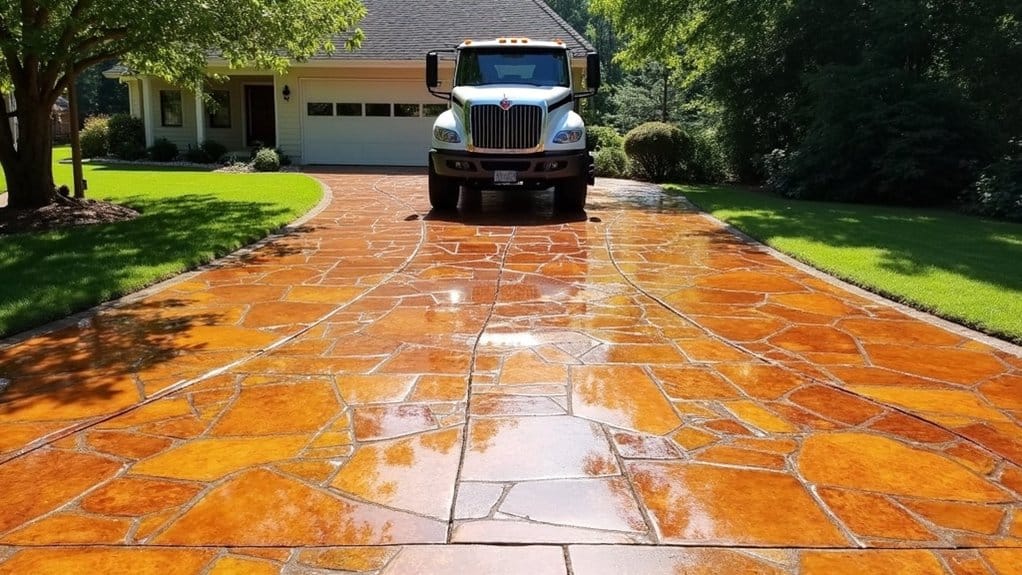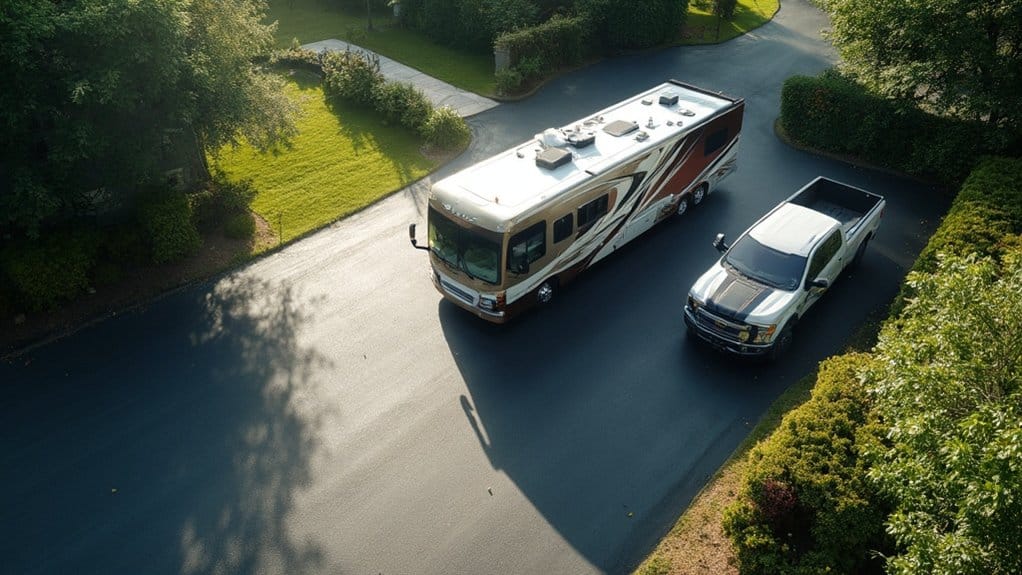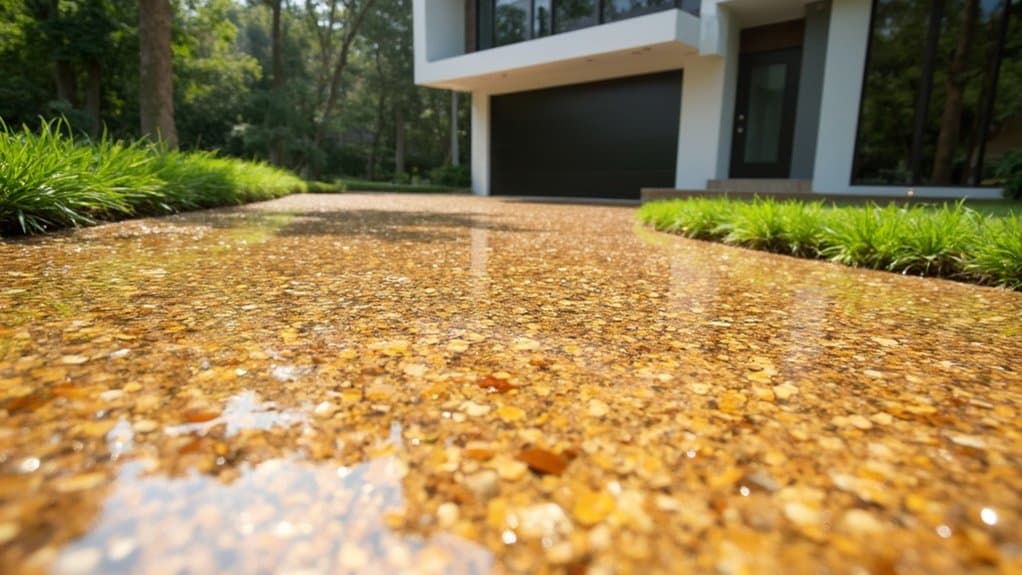Yes, resin driveways can support heavy vehicles, typically handling loads of up to 7.5 tonnes with a standard thickness of 15-18 mm. A strong sub-base and high-quality materials improve their durability and load-bearing capacity. For heavier vehicles, it’s essential to use thicker layers to ensure adequate support. Proper installation is key to ensuring longevity, and regular maintenance helps preserve their strength. If you’re curious about the benefits of resin driveways compared to other materials, there’s plenty more to discover.
Table of Contents
ToggleKey Takeaways
Resin driveways can support vehicles weighing up to 7.5 tonnes when installed with a standard thickness of 15-18 mm. If you need to accommodate heavier vehicles, a thicker layer is essential to provide adequate support and prevent damage.
A strong sub-base is crucial for distributing weight effectively and enhancing durability. The flexible honeycomb structure of resin driveways helps reduce the risk of cracking under heavy loads. With proper installation and maintenance, resin driveways can last between 20 to 25 years, even with frequent heavy vehicle use.
Understanding Resin Driveway Composition
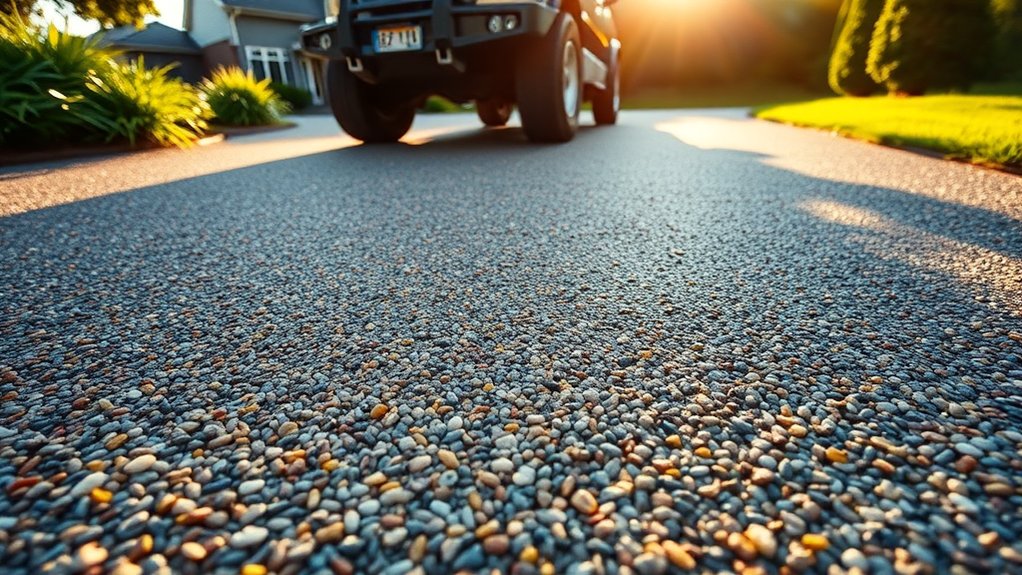
When choosing a resin driveway, it’s important to grasp its composition, as this affects both performance and durability.
A resin driveway mainly comprises aggregate stones coated with a binder, usually either polyurethane or epoxy resin. Polyurethane is known for its UV stability and flexibility, while epoxy is recognised for its strong adhesion. The choice of aggregate influences the driveway’s appearance, including its colour and texture, so it’s vital to ensure each stone is properly coated for optimal performance. Additionally, selecting high-quality materials and contractors is essential to prevent drainage issues that could compromise the driveway’s integrity.
There are two main installation methods: resin-bound and resin-bonded. A resin-bound system blends resin and aggregates before application, creating a smooth, permeable surface. In contrast, a resin-bonded system involves scattering stones over a layer of resin, resulting in a less permeable finish. These factors are crucial for building a sturdy driveway that can withstand heavy vehicles, as the polymerization process during curing enhances the overall durability and strength of the surface.
Load-Bearing Capacity of Resin Driveways
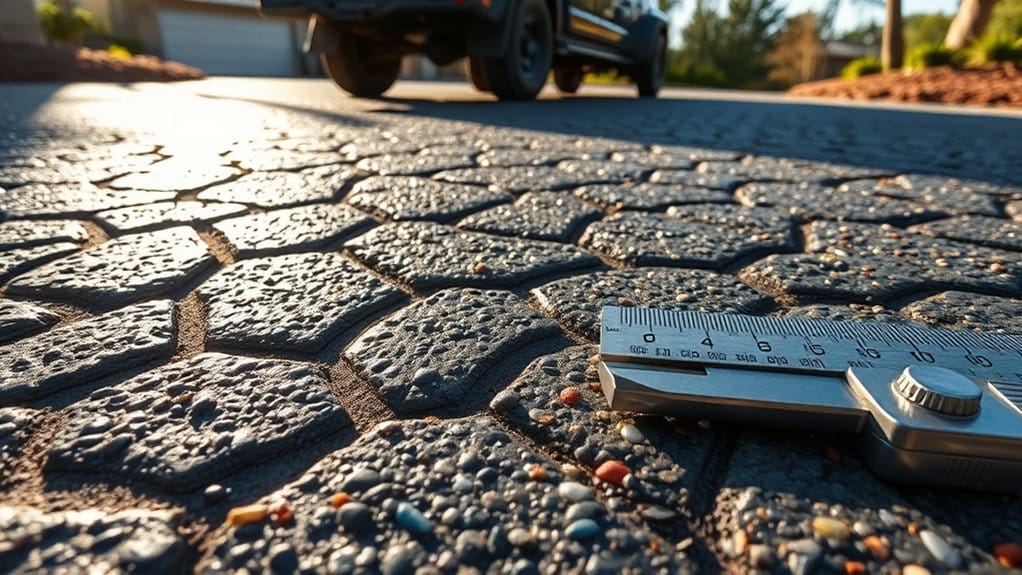
When looking at the load-bearing capacity of resin driveways, it’s important to remember that a standard thickness of 15-18 mm can support vehicles up to 7.5 tonnes. Most family cars and small vans fit comfortably within this limit. However, for heavier vehicles like delivery vans and lorries, a thicker resin layer is necessary to ensure optimal performance. Proper installation and careful preparation of the sub-base are crucial to enhance the driveway’s ability to handle substantial loads, as a strong sub-base significantly impacts overall weight capacity. Additionally, a solid sub base ensures even weight distribution and prevents structural issues that may arise from heavy loads.
Standard Vehicle Support
Understanding the load-bearing capacity of resin driveways is crucial for ensuring they can support the intended vehicles without risking damage.
Generally, a standard resin driveway thickness of 15 to 18 mm can comfortably hold vehicles weighing up to 7.5 tonnes. This makes it suitable for family cars, small vans, and light traffic.
When considering vehicle weight, it’s essential to ensure the sub-base is well-prepared and strong, as this significantly affects load distribution and durability. High-quality resins combined with selected aggregates are key to enhancing the driveway’s strength. Additionally, the exceptional longevity and durability of resin driveways ensure they can withstand regular use without compromising their structural integrity.
Adequate thickness and reinforcement techniques can further improve the driveway’s ability to withstand typical residential and light commercial vehicles without cracking or deforming, ensuring long-lasting performance.
Heavy Vehicle Limitations
While resin driveways can handle various vehicle weights, they have specific limitations for heavy vehicles like trucks and lorries. It’s important to know the specifications of heavy vehicles for proper driveway design. Generally, resin surfaces can support loads of up to 7.5 tonnes, depending on the mix and installation.
Here are key factors affecting load-bearing capacity:
| Factor | Impact on Capacity | Recommendations |
|---|---|---|
| Base Material | Distributes weight | Use a robust sub-base |
| Surface Thickness | Affects durability | Ensure adequate thickness |
| Aggregate Distribution | Prevents damage | Maintain even distribution |
| Resin-to-Aggregate Ratio | Enhances binding | Optimise the mix ratio |
| Reinforcement Techniques | Strengthens surface | Consider fibre reinforcement |
Durability and Maintenance Considerations
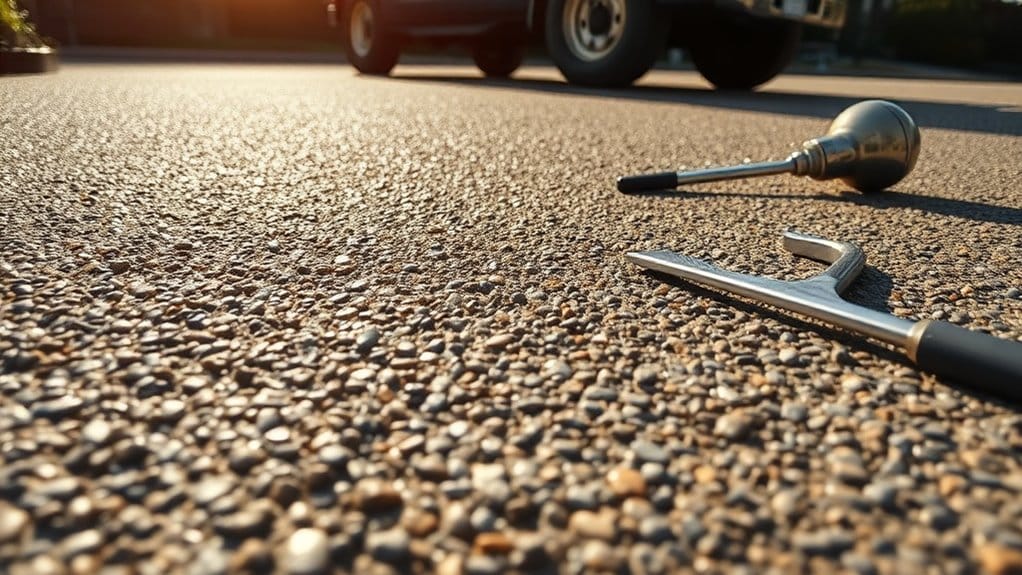
Resin driveways are known for their durability and ability to handle heavy loads, but their long-term performance relies on proper installation and maintenance.
Using techniques like crack reduction membranes and high-quality aggregates during installation ensures your driveway can cope with heavy vehicles.
With a lifespan of 20–25 years, it’s essential to conduct regular inspections and make prompt repairs to keep it structurally sound.
The smooth, sealed surface resists damage from environmental factors like salt and stains, which means you won’t need to maintain it as often.
A periodic clean will help keep it looking good and extend its life.
Comparing Resin Driveways to Other Materials
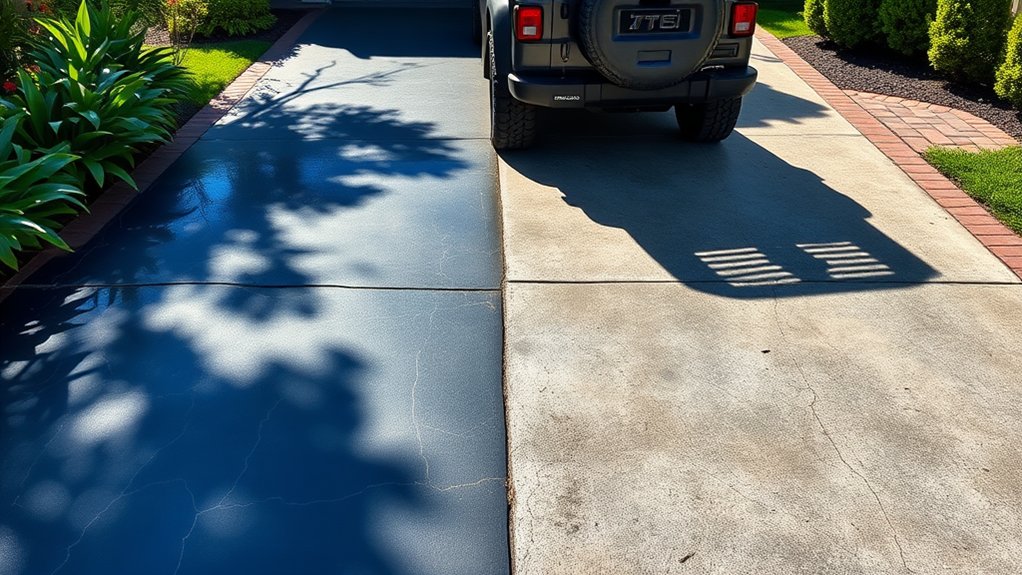
When comparing resin driveways to other materials, it’s important to look at how they perform under heavy vehicle loads.
Resin driveways stand out due to their flexible honeycomb structure, which allows for lateral expansion and reduces the risk of cracking. In contrast, concrete often struggles under pressure and can fail.
One of the key benefits of resin is its excellent drainage capabilities, which help prevent water pooling. It also maintains a visually appealing surface that doesn’t fade over time.
When compared to tarmac, resin offers a smooth finish that resists rutting, ensuring stability even with heavy vehicles.
Moreover, resin creates a compact, interlocked surface, unlike loose gravel that can shift and create uneven spots.
Although the initial investment may be higher, the long-lasting durability and low maintenance of resin driveways make them a more dependable option for heavy vehicle use.
Importance of Reinforcement Techniques
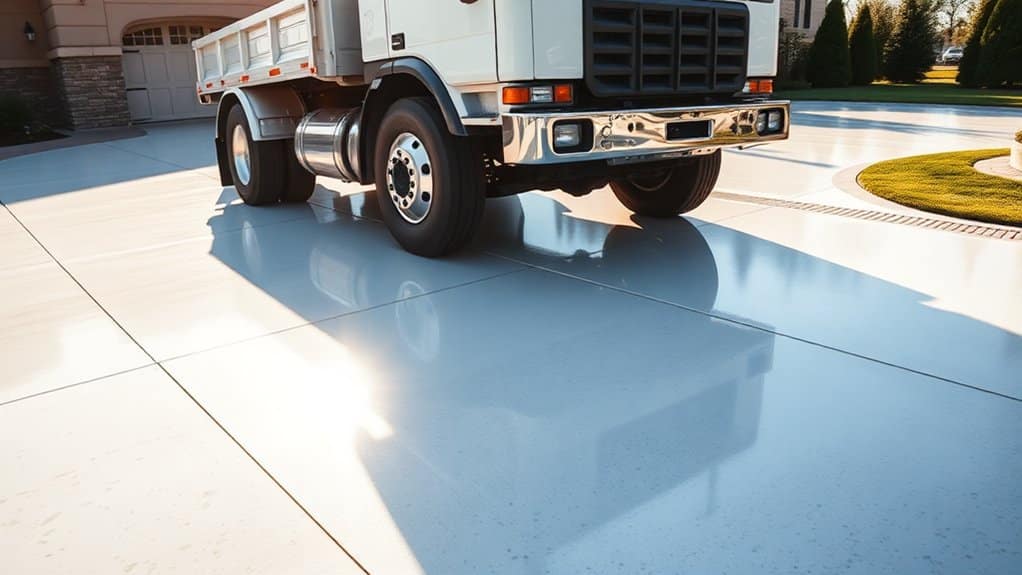
To ensure resin driveways withstand heavy vehicle loads, effective reinforcement techniques are essential. Using substrate reinforcement methods, like reinforcing mesh or geotextile layers, significantly boosts load-bearing capacity and reduces cracking.
A sturdy tarmac base beneath the resin surface is crucial for maintaining structural integrity, especially for heavy vehicles.
Before installation, it’s vital to inspect and prepare the existing substrate, ensuring it’s clean and stable to avoid resin failure. Proper compaction and a thickness of at least 18mm help distribute weight evenly and minimise substrate deformation.
Additionally, installing block edging around the perimeter helps keep the driveway’s shape under pressure.
Industrial and Commercial Applications of Resin Driveways
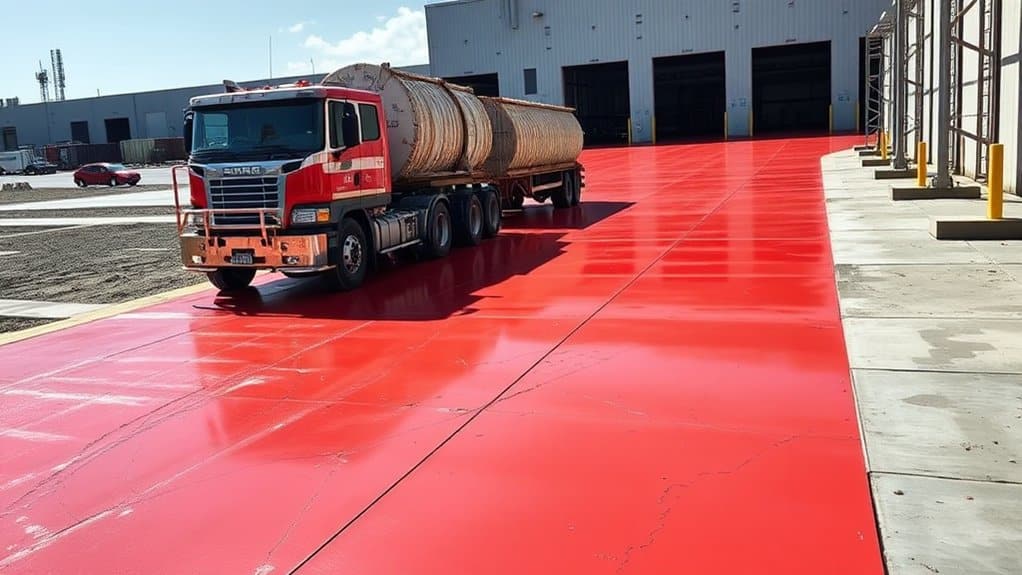
As businesses focus on durability and safety, resin driveways have become a popular choice for industrial and commercial use. Their robust load-bearing capacity makes them suitable for car parks, loading bays, and logistics centres, capable of supporting heavy vehicles and equipment.
The smooth surfaces help prevent trip hazards and comply with accessibility standards.
Resin driveways are also versatile in design, allowing for custom colours and finishes to align with branding while still being functional. Their permeable nature ensures effective water drainage, reducing the risk of flooding and slips.
Evaluating the Cost-Effectiveness of Resin Driveways
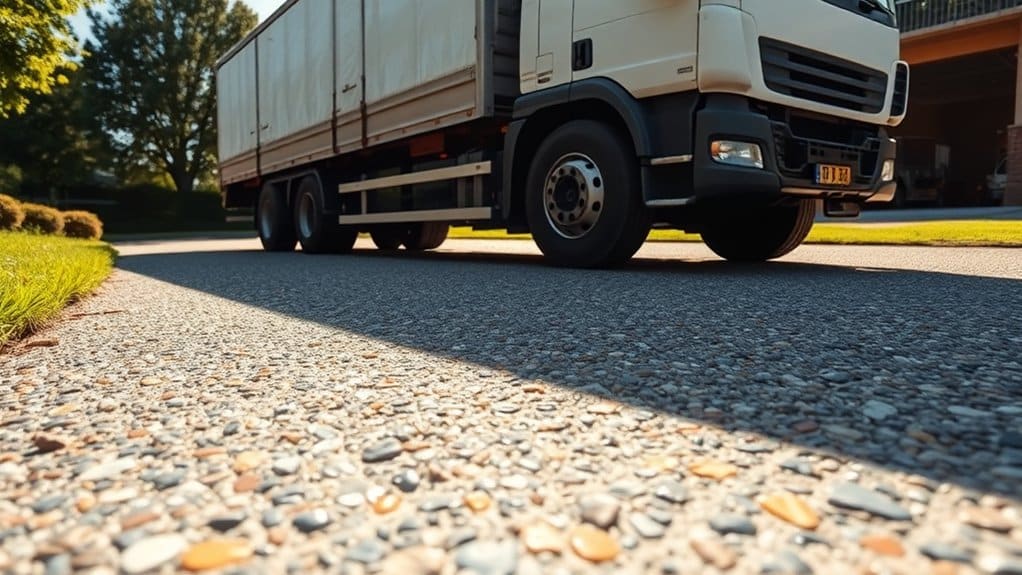
When evaluating the cost-effectiveness of resin driveways, it’s essential to weigh their long-term durability against maintenance costs.
Although the upfront price may be higher than alternatives like tarmac or gravel, resin driveways often require less upkeep and last significantly longer, resulting in savings over the years.
For instance, while a tarmac driveway might need resurfacing every few years, a resin driveway can easily last a decade or more without major repairs.
Assessing these factors will help you decide if a resin driveway suits your needs.
Long-Term Durability Benefits
When considering the cost-effectiveness of resin driveways, their long-term durability is a key benefit. With proper installation, resin driveways can last over 20 years. This is due to high-quality UV-stable resin that prevents fading and strong aggregates that enhance durability. They can withstand heavy vehicles, supporting weights of up to 7.5 tonnes.
Moreover, the permeable design of resin driveways helps manage water drainage, reducing environmental impact and complying with Sustainable Urban Drainage Systems (SuDS). This feature also minimises water pooling and freeze-thaw damage.
Because of their resilience, resin driveways require fewer repairs over time, making them a smart financial choice. In short, their longevity and ability to handle heavy loads make them a cost-effective investment.
Maintenance Cost Comparison
The long-term durability of resin driveways not only enhances their attractiveness but also significantly reduces maintenance costs. By following simple maintenance routines, you can ensure their longevity and keep expenses down.
- Prevent costly repairs with regular maintenance.
- Benefit from lower upkeep costs compared to concrete or tarmac.
- DIY maintenance options help you stick to your budget.
- Potentially increase your property value by up to 10%.
- Spend less time worrying about major repairs.
Basic tasks like sweeping and annual power washing are easy and inexpensive.
When compared to other materials, resin driveways offer a cost-effective maintenance solution, making them a smart investment for durability and financial sense.
Initial Investment Analysis
Resin driveways may have a higher upfront cost than traditional materials like tarmac or gravel, but their long-term value is clear.
While gravel might seem cheaper initially, it requires ongoing maintenance that can add up over time. In contrast, resin driveways can last 20 to 25 years, significantly outlasting tarmac and gravel.
Moreover, resin driveways enhance your property’s aesthetic appeal and value, making the initial investment worthwhile.
Their quick installation and low maintenance needs also provide a positive long-term financial outlook.
If you’re looking for durability and style, resin is a smart choice for homeowners.
Frequently Asked Questions
How Long Do Resin Driveways Typically Last?
Resin driveways generally last between 15 to 25 years, depending on the quality of the resin and the weight of vehicles using them. Using high-quality materials and ensuring proper installation can significantly improve their lifespan. For example, if you regularly park heavy vehicles, investing in a more durable resin will help maintain your driveway’s condition over the years.
Can Resin Driveways Be Installed in Cold Climates?
Resin driveways can indeed be installed in colder climates, provided the resin is formulated appropriately. Using the right techniques ensures they remain durable and can handle harsh weather conditions, maintaining their structural integrity effectively. For instance, just as you’d wear a warm coat to brave the cold, the right resin protects your driveway from freezing temperatures and frost damage.
Are There Color Options for Resin Driveways?
Yes, there are numerous colour options and finishes for resin driveways. You can choose from a wide range of shades and textures to ensure your driveway complements your home’s style. For instance, you might opt for a classic grey for a modern look, or a warm terracotta for a more traditional feel. Customisation lets you personalise your driveway to suit your tastes perfectly.
How Long Does the Installation Process Take?
The installation process usually takes between 1 to 3 days. This can vary based on the size of the project, the conditions at the site, and the weather. For more complex designs, it may take up to a week.
Can I Repair a Damaged Resin Driveway?
Yes, you can repair a damaged resin driveway. Essential maintenance includes cleaning the surface, preparing it properly, and applying the appropriate resin repair. Always follow the manufacturer’s guidelines for mixing and curing to ensure a strong, seamless finish. For example, if you notice cracks or discolouration, addressing these issues promptly can prevent further damage and keep your driveway looking its best.
Conclusion
In summary, resin driveways are exceptionally strong and can easily support heavy vehicles. When properly installed, they can match the durability of many traditional materials. Plus, they require minimal maintenance. If you’re looking for a reliable driveway that can withstand wear and tear, resin is a solid choice. You won’t be disappointed!
Find out if tarmac driveways can handle the weight of your RV or truck and discover the key factors that Read more
Learn about the benefits, types, and installation process of resin driveways, and discover why they might be the perfect choice Read more
Are you confused about resin-bound and resin-bonded driveways? Discover the key differences that could impact your property choice.

